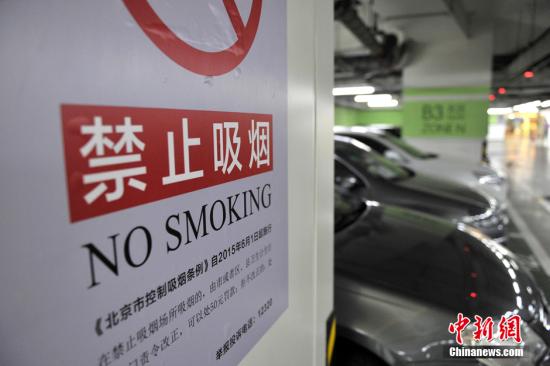(Two Sessions Express) To prevent the disorderly growth of the e-cigarette industry, the representative suggested establishing industry regulations to keep young people away from e-cigarettes
China News Service, Beijing, March 7 (Reporter Zhang Ni) "Adolescents are prone to addiction once they smoke e-cigarettes. The next step is to switch to cigarettes." He, deputy director of the Health Education Institute of the Guizhou Center for Disease Control and Prevention, is the representative of the National People's Congress. Lin expressed concern in an interview with a reporter from China News Agency during the National Congress of the People's Republic of China.
At the National Two Sessions this year, she put forward suggestions on "protecting young people away from e-cigarettes and speeding up the introduction of industry regulations."
The picture shows the no-smoking announcement posted in an underground parking lot in Beijing.
According to the results of the 2018 China Adult Tobacco Survey, the use rate of e-cigarettes in the 15-24 age group is 1.5%.
The most important way to obtain e-cigarettes is the Internet.
Regarding the regulation of e-cigarette sales, there have been early actions at the national level.
In 2018, the State Administration for Market Regulation and the State Tobacco Monopoly Administration issued the "Notice on Prohibiting the Sale of Electronic Cigarettes to Minors."
In 2019, the above two departments jointly issued a document urging e-commerce platforms to remove e-cigarette products in a timely manner.
The new version of the Law on the Protection of Minors that will be implemented on June 1 this year also states that “No tobacco, alcohol, or lottery sales outlets may be set up around schools and kindergartens. It is forbidden to sell cigarettes, alcohol, lottery tickets or redeem lottery prizes to minors.” Among them, it covers electronic cigarettes.
"Although the official document bans online sales of e-cigarettes, offline control is not ideal. For example, a stationery store near a primary school in a city peddled e-cigarettes to students, e-cigarettes incarnate "atomized energy bars" and other issues have been exposed one after another. Out.
The issue of e-cigarette addiction is the focus of He Lin’s concern. “There is no industry standard for e-cigarettes in China. One is the content of nicotine, which is an addictive substance, and the other is whether other added flavor substances are harmful to health. "
He Lin said that some e-cigarettes claim that the nicotine content is very low, but the actual test results are not the case, which is very harmful to young people.
In addition, e-cigarettes are an electronic transmission system. It is not clear what substances are contained in some electronic components. Vicious incidents of e-cigarette explosions have occurred in foreign countries. Therefore, industry regulations need to be established urgently.
"How to keep young people away from e-cigarettes" is not only He Lin's concern.
At the National Two Sessions this year, Sun Chengye, a member of the National Committee of the Chinese People's Political Consultative Conference and a researcher of the Chinese Center for Disease Control and Prevention, also suggested that the law on the protection of minors should be strictly enforced. It can be followed, and comprehensive management measures such as the production and sales of electronic cigarettes must be formulated.
Sun Chengye believes that e-cigarettes are a different product from traditional cigarettes. If you copy the cigarette management model, it will not be conducive to the management of e-cigarettes.
In He Lin's view, after the introduction of laws and regulations, how to implement them is the key.
Next, provinces can issue corresponding measures that can be implemented in accordance with the Law on the Protection of Minors, including how to define the specific scope of "schools around" and how to increase penalties by market supervision departments, so that laws and regulations have teeth.
"We often say that we want young people to refuse the first puff, and e-cigarettes should also be refused," He Lin said.
(Finish)

